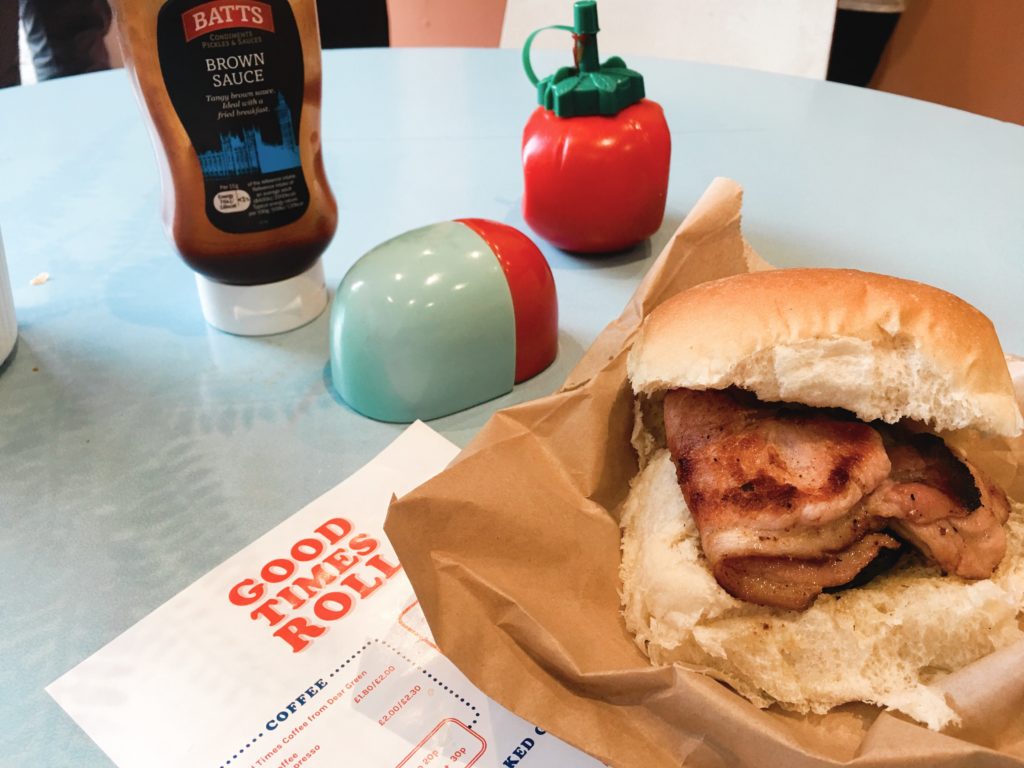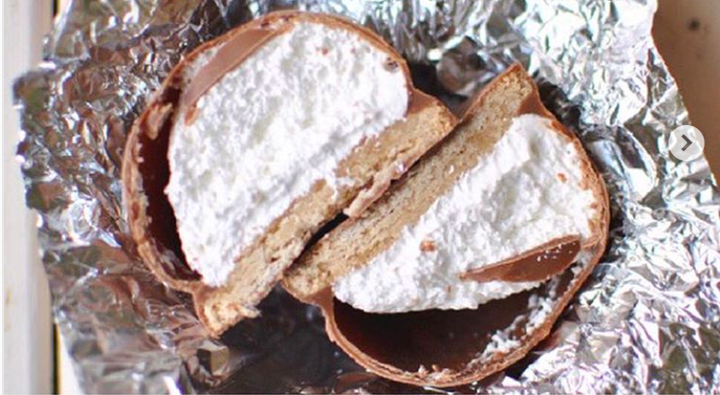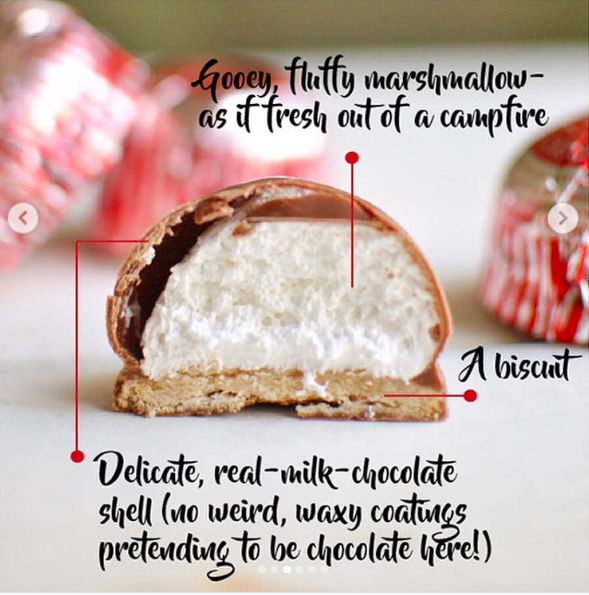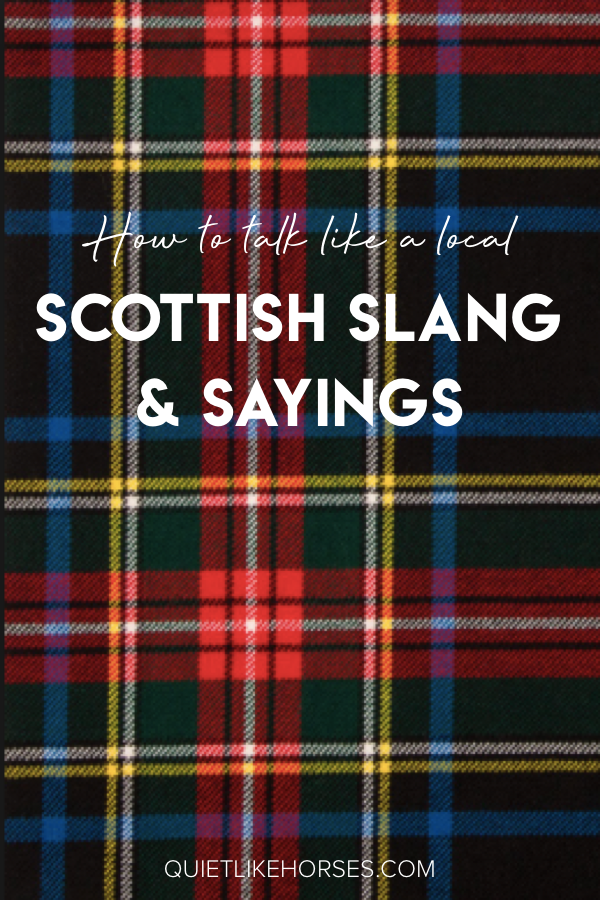Let’s say you’re in Glasgow. It’s lunch time, and the person you’re with turns to you. She asks, “What do you want on your piece?”
Do you answer:
A) Pepperoni
B) Ham and cheese, hold the pickle
C) My piece? What piece?
If you answered C), me too. If you answered A), getting close. A piece is a type of food. If you answered B), ding ding ding! You got it.
A piece is Scottish slang for a sandwich. I learned about it last month when James and I were back in Glasgow (his hometown) for Christmas. Every time I visit, I come back with entire lists of Scottish slang I didn’t know.
So whether you’re headed to Scotland soon or just want to brush up on your Scottish slang, keep reading to learn how to talk like a Glaswegian local.
How to Greet People
Ask if people are alright. Everyone in Scotland wants to know if you’re alright. At first I wondered if maybe I seemed out of sorts because everyone kept asking me, but after a while, I started to feel very cared for. So instead of saying “how are you,” just ask “y’alright?”
How to Order at a Restaurant
For fish and chips, order a fish supper. Anything “supper” means “with chips.” (And chips, of course, mean fries.)
To get just a piece of fish, order a single fish. Then steal chips off your neighbor’s plate 😉
For a more substantial meal, ask for a fish tea. This comes with fish and chips, a cup of tea and bread and butter.
Drink Irn-Bru. According to Scotsman Food and Drink, Coca-Cola is the number one-selling soft drink nearly everywhere in the world—except in Scotland, Iceland, Peru and the Middle East. Bright orange, Irn-Bru tastes like… “like Irn-Bru.” (An exact quote from James, ha!)
Need more ketchup? Ask for an extra sachet. James says calling them packets of ketchup sounds fancy, but I think sachets take the cake. Tip: Expect to pay for extra sauce. Sachets in Scotland aren’t free. (Now I understand why he gets so excited about all the free sauces at Chick-fil-A.)
For a breakfast sandwich, order a “roll and” XYZ. Scottish people are very particular about the makings of a good roll. It’s all about the bread. I watched a waitress serve a burnt roll to a customer, but James informed me that was actually “a well-fired roll.” People are crazy about them.

You can get a roll and egg, a roll and egg and bacon (my personal fave), or any of the items below. Just be sure to order it as a “roll and” and not a “roll with.”
- black pudding (a type of blood sausage)
- tattie scone (a type of potato pancake)
- square sausage (often referred to as “square”)
- Notes: Bacon, or back bacon as it’s called there, looks like a piece of ham. If you’re looking for bacon like the kind we have in the U.S., ask for “streaky bacon.” And don’t ask for cheese in your roll. It’s not a thing!
Get crisps if you want potato chips. Cheese and onion crisps all the way.
Get biscuits if you want cookies. Not quite like cookies, biscuits are in a category of their own. If you’re ever in Scotland (or anywhere in the UK), visit the biscuit aisle at the grocery store and you’ll see what I mean. These dark chocolate Tunnocks tea cakes are my absolute favorite.


Try pickle in your cheese sandwich. I thought it was a trick question when James asked if I knew what pickle was after I ordered a ham, cheese and pickle sandwich. Turns out it wasn’t. All he said was, “You don’t know what pickle is.”
When the sandwich came, instead of where my green pickle slices should have been, there was a chunky brown spread. “That’s pickle!” James said. A sweet, vinegary, pickled chutney, pickle is made of rutabaga, carrot, onion and cauliflower. It’s actually pretty tasty (if you like pickled things).
How to Describe People
Every guy is a boy, no matter how old they are. When we went to a football match, James’ brother went to “meet a boy” to get an extra ticket. Imagine my surprise when the teenager I pictured in my head turned out to be a 45-year-old man.
A burd is a girl. To get the latest scoop on his friend, a guy might ask, “Do you have a burd?”
Kids are weans. It’s pronounced waynes. “How are the weans?”
Mangled. Another word for drunk, hammered, sloshed, or plastered.
Dodgy. Sketchy.
Cheeky. When someone’s being a smart aleck. (Observation: British people are often cheeky.)
Chancer. Someone who’s in between dodgy and cheeky.
How to Describe Things
Honking, humming, howling. Also, minging. All colorful ways to say something’s bad. “That take-out was minging.”
Brilliant, magic. How to describe good things. “That was brilliant.”
Wee. Perhaps my favorite Scottish saying, wee means little. Everyone says it all the time. Even tough guys on the train. Once a shorter guy squeezed in next to me saying, “I’m just a wee guy.”
Quite. “I quite liked it” or “It was quite good.” Sounds so posh, doesn’t it?
How to Make Friends
Call someone big man. It’s kind of like calling someone “bud.” I thought maybe it was an insult in disguise until James’ best friend told me it’s his favorite.
Call everyone mate. I wish we called each other mate in the U.S. It instantly sets a friendly tone.
Say cheers instead of thanks.
How to Find the Bathroom
Ask for the toilets. Or ask for the wash closet. Just don’t ask for the bathroom or restroom.
Bog roll. What they call toilet paper in Scotland. (Also probably in Harry Potter.)
How to Shop
Underwear are called pants and pants are called trousers. I know. They think our names are silly, too.
Sweaters and sweatshirts are called jumpers.
Beanies are called wooly hats. Cutest name ever.

How to Say Yes and No
Aye is yes.
Naw is no.
Nae bother is no worries.
How to Sign Off
Say yes to X. Skip the Os, and sign off on your emails, texts and notes with a single x or multiple xxxxx.
How to Add Color to a Conversation
Ehm is the equivalent of um.
Ooft is ouch. “Ooft, that hurt.”
Oft (with one O) is OMG. “Oft, the Rangers won.”
Drop an F bomb… or two or three. Mums say it. Grandmas say it. Everyone says it. Try using it in casual, non-heated conversations.
How to Pronounce Cities
Last but not least, if you want to talk like a local, be sure to pronounce the two main cities correctly.
Glasgow is glaz-go and Edinburgh is edin-burr-uh.
Have you been to Scotland? Did you hear any of these?
p.s. Planning a trip soon? Check out my travel guides for fun destination ideas.


👏🏻
Seems your tips will save us a lot of confusion and miscommunication on our 2020 trip to Scotland (Oft! The 2019 calendar is f@<€… full already.)
Thanks!
Thank you! Headed there this hear and this will be quite helpful. Is there someplace you would recommend finding pronunciations for cities and towns in Scotland? We are driving all over the country for 12 days and should we need to ask for directions I don’t want to sound like a complete idiot.
Hi Leah, how fun! You guys are going to have a blast. So I asked a Scottish person for you and his advice was to just ask people when you get there because people are friendly, and it’s better to ask than to just say the wrong thing. I know that helps to take some of the pressure off!
Wow! This was so interesting and fun to read! I want to go to Scotland now! 😂
You’ll be going soon! 😀
Just a wee bit of advice about the f word. It is used frequently in normal conversation among friends but if you don’t want to be considered rude or aggressive, do not use it when speaking to non family or friends.
Good point, eileeen! 🙂
Oft, Eileeen! I was so happy that I would fit in. Way to burst a wee burd’s bubble.
That was great, Thanks!
Thanks for reading, Barbara! Hope you get to use some of these sayings soon.
Hi, going to Highlands in May this year and we’re softy southerners so ta for the tips,looking forward to it for our honeymoon up with the haggii, 😊
Sandy, have so much fun! I’ve never been up there, but it looks beautiful.
Here a couple more for you to pass on though I’m sure your husband has told you them already. When someone says “Where do ya stay” They are asking “Where do you live”? If someone says to you if you would like it in a poke, they mean a bag. Though I haven’t heard this one of late. Another, have you got your messages? Means have you got your shopping.
I have lived in Scotland now for 33 years and I am still hearing new phrases. You also have to take in different sayings for different areas. If you don’t understand just ask, no one minds. Oh, don’t forget to buy Scottish Tablet. Ask your husband about it. I hope all that come to Scotland will enjoy it and just remember if it’s raining just wait 5 minutes and the weather will change. I was originally from England but my family are Scottish and Irish.
Thanks, Angela, those are some good ones. James brought some tablet home — it was interesting, haha!
Perhaps the word “poke” is used less now because fewer shops sell things in those small paper bags often described as a packet or pocket either of which could be pronounced “pawket” and abbreviated to “pawk” or as you describe it, “poke”.
When sweets (Candies in U.S. and Lollies in Oz) were sold loose from large jars they would be scooped into those small paper pawks by the quarter pound. With fewer old style Sweet Shops around now and standard English more common, the expression is being lost to posterity.
Quite —
How interesting! My father grew up in Appalachia. His family is mostly Scottish/Welsh from waaay back, but they’ve retained a lot of the Scottish in their ways. He used “quite” a lot, as did his father, my grandfather. No one else around us spoke that way, but now zip see it was the Scottish in them coming out. Thank you for such an interesting article!
I love it 🙂 Thanks for sharing about your family!
My family is also old Scottish descent, and have lived for generations in Appalachia. We say poke for bag. Think of how much hillbilly music sounds like bagpipes. And so wonder they make such good Moonshine!
I’ve been twice. My favorite place in the world. Explain what “See you, Jimmy” means.
Have been to Scotland and have very few communication issues. Most importantly, they’re chips not fries. Most problems were understanding some with a very heavy brogue.
The best way to handle a heavy brogue is to ask people to slow down when talking. I grew up in Scotland, but when I went home, my cousin’s 4 year old came to visit and started talking and I didn’t understand a word she said…lol
I was brought up in Knightswood, Glasgow, during the war so carried these phrases with me for most of my life. We moved down to South Wales and I took an instant dislike to the Cardiff accent at school my Mother was called in to ask what language
I spoke as they had asked other children in that part of the city, Chinese, Turks, Greeks, to translate but none of the could, so what language did I speak?
English of course, … but it might have been his Glasgow accent.
This is simple stuff so far. Good luck if you end up in Aberdeenshire. Loons are young boys and Quines are girls. A common greeting can be “Whoos yer doos?” with the response “Aye chappin!” a Doo is a Pigeon and keeping and racing pigeons is popular up there. Don’t worry . Scots are friendly and generally go out of their way to help any visitor whatever their dialect. Remember every one of us has our own language. Think Cockneys, Geordies, Brummies and people from Somerset as examples. Our language is one of the things that makes us who we are and after all “We are all Jock Tamsons bairns!”
Is Glasgow not pronounced——- glez – ga ?.
Only by the natives. 😊
I`m from East Lothian and a lot of this slang appart from Glasgow incomers is`nt spoken here for instance waynes over here are bairns and a poo here is a crab not a crap whilst a cormorant here is a skart and a mole hill is a moudiewart and in Eyemouth a criv is a lobster creel. There are 3 different dialects in Scotland – Lallan Scots – Buchan Glaik – & The Gaelic but listening to the Bairns today they are dying out & TV and Media are part to blame – Keep the Heid CU CCC.
Great tips, Sobrina! I would add just one or two: everyone greets with ‘Hiya” and “yous” is the correct form for “you”, as in “Hiya, yous alright?”
just one wee point, children are only called weans in the Glasgow area for the east and north children are called bairns. And there are lots of other interesting words, braw = good, scunnered = fed up, wallies = teeth, breechs = trousers (pants to americans)…. don’t be afraid to ask if yea dinna ken (Don’t know).
if your crude enough to ‘drop a F bomb’…it’s pronounced FECK
Wife and I were there three weeks last year drive from Liverpool up the west side to Inverness, cross to Aberdeen, down the East side and back to Liverpool.
Scotland is the most awesome country. Rich in heritage, beautiful scenery, great food, and the friendliest people with a fantastic sense of humor.
A “GRRRREAT” – roll that R – country.
PS- HIGHLY recommend a GPS if your driving – and someone else to navigate cause you’re gonna be way to busy keeping to the left trying to stay on the narrow motor ways, and not get hit by a tour bus.
We would go back in a heartbeat.
Excellent suggestions for Scotland as I’m touring Ireland, then Scotland May of 2020.
I want to try haggis and of course, Irn-Bru….well, all things Scottish (and Irish too). Thanks so much!
Which reminds me…. is there a different way to say ‘excuse me’ as when you accidently bump into someone, and any different way to say ‘please’ or ‘thank you’?
Enjoyed this post as I live near Edinburgh, moved from the US, and like to share some of these wee things with friends who visit. In response to Lee, in place of excuse me, I hear many people say ‘Sorry’. I can’t recall a specific word to use rather than ‘please’, but people might say, ‘if you don’t mind…’ before asking a question or ‘could I trouble you for…’ For thanks, you can say ‘cheers’. Hope this helps. Enjoy your trip, mate.
Charles Cameron Carruthers,
You forgot about the Doric language. Commonly spoken around Aberdeenshire. It’s still used as much as ever, in my experience.